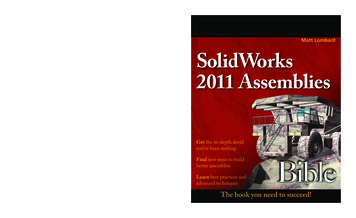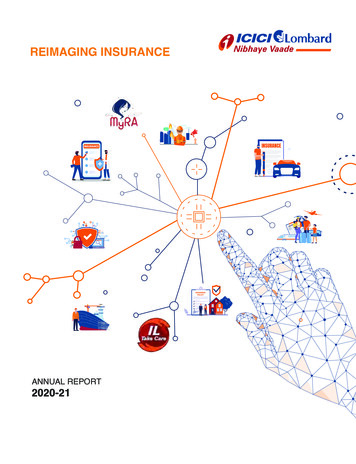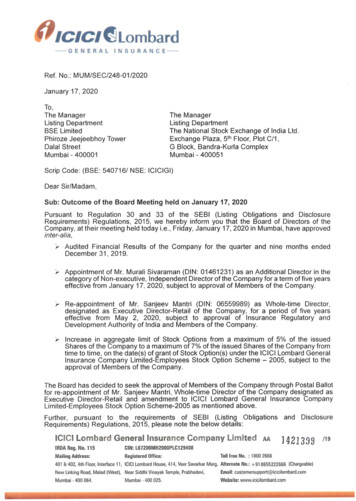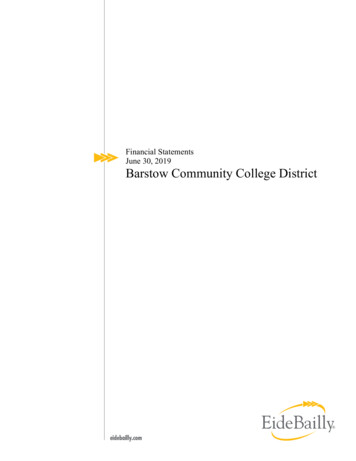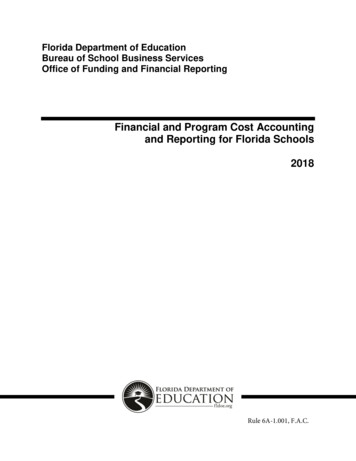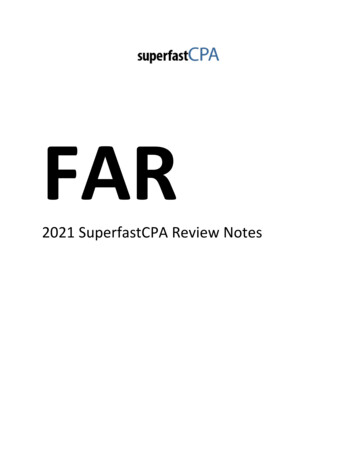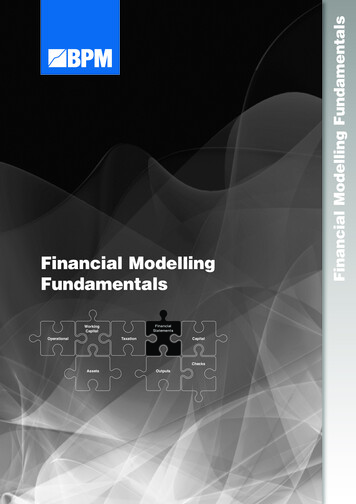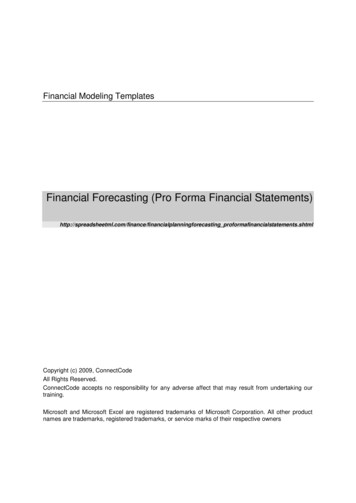
Transcription
ANNUALFINANCIALSTATEMENTSFOR THE YEAR ENDED 30 JUNE 2020
Registration number1990/001253/06Country of incorporation and domicileSouth AfricaNature of business and principal activities Underwriting of non-life insurance risks, such as those associated withaccident and health, guarantee, liability, marine, motor, property andengineering in both the commercial and personal lines of business.DirectorsML JaphetPJ OrfordRJ SymmondsGJM CarlinCE BackebergAC MagwentshuA PienaarRegistered office4th floor22 Wellington RoadParktown2193Postal addressPO Box 1411Killarney2193Holding companyLomHold Proprietary Limited incorporated in South AfricaAuditorPricewaterhouseCoopers Inc.SecretarySJ VivianThese financial statements were internally compiled under the supervision of:N Hoosen (Bcom Financial Management)(Head of Finance)LOMBARD INSURANCE ANNUAL FINANCIAL STATEMENTS 2020GENERAL INFORMATION
FOR THE YEAR ENDED 30 JUNE 2020CONTENTSCorporate Governance Statement. 1 - 11Directors’ Responsibilities and Approval. 12Company Secretary’s Certification. 13Audit Committee Report. 14 - 16Independent Auditor’s Report. 17 - 22Directors’ Report. 23 - 24Statement of Financial Position. 25Statement of Profit or Loss and Other Comprehensive Income. 26Statement of Changes in Equity. 27Statement of Cash Flows. 28Accounting Policies. 29 - 42Notes to the Financial Statements. 43 - 86LOMBARD INSURANCE ANNUAL FINANCIAL STATEMENTS 2020ANNUAL FINANCIAL STATEMENTS
1In line with the King IV Report on Corporate Governance for South Africa, 2016 (King IV ), Lombard InsuranceCompany Limited’s (Lombard) key corporate governance pillars are: Ethical and effective leadership; Sound and ethical governance; Integrity; Accountability; and Providing timely, relevant and meaningful reporting to all stakeholders.The Board has established several sub-committees, which operate within defined written terms of reference, suchterms of reference having been proposed and recommended by these sub-committees for approval by the Boardin writing. Members of these committees are suitably qualified and experienced so as to meaningfully contribute tothe workings of the committees on which they serve. All committees report to the Board and operate in accordancewith written terms of reference approved by the Board. The most relevant of these committees, which shall be furtherdiscussed below, are the Audit Committee, the Risk and Compliance Committee, the Capital Management andInvestment Committee, the Reinsurance and other forms of Risk Transfer Committee, the Remuneration Committeeand the Social and Ethics Committee.Due to the nature of the operations carried out by Lombard Insurance Company Limited, LomVest (Pty) Ltd and LomHold(Pty) Ltd (hereinafter referred to as the Group), the Board operates in a highly regulated environment with the aim of longterm sustainability and meeting financial soundness standards determined by the Prudential Authority. Further, certainstatutory governance appointments have at all times been maintained throughout the year. These appointments are thatof the Group Company Secretary, the Head of Risk Management, the Head of Compliance, the Head of Internal Auditand the Head of Actuarial Function for Lombard. All of these roles will be more fully discussed below.The Board, through the guidance of the sub-committees, recognises its responsibility to exercise effective leadershipby adhering to its fiduciary duties, collectively and individually, as the directors of Lombard in order to lead effectively.The Board possesses the required skills and competence, and acts in an ethical manner when discharging itsresponsibilities and control of Lombard as outlined in the Group Governance Policy and the Group Board’s terms ofreference. The Group Governance Policy, which is reviewed annually, serves as a guide to the Board and outlines theprocess for policies and practices on Board matters, such as dealing in securities, declaration of conflict of interests, andthose matters delegated to management.The Board, through the office of the Group Company Secretary, considers and deliberates on declarations when there isa conflict of interest at every Board meeting.The Board is committed to ensuring that the Group’s strategy and operations are executed by management based on anethical foundation that supports ethical and sustainable business in the best interest of the Group and all stakeholders.The Group corporate governance policy framework details optimal corporate governance principles as well as the Groupauthorisation requirements. The Group corporate governance policy framework provides for those matters that arereserved for the Board’s decision-making authority to enable the Board to exercise effective control and ensure theGroup’s good performance and legitimacy.ORGANISATIONAL ETHICSThe Social and Ethics Committee exercises ongoing oversight responsibility for setting and reporting on Lombard’sethical values, principles of conducting ethical business practice, human and environmental rights considerations, andfor Lombard to be a responsible corporate citizen.LOMBARD INSURANCE ANNUAL FINANCIAL STATEMENTS 2020CORPORATEGOVERNANCE STATEMENT
2RESPONSIBLE CORPORATE CITIZENSHIPIn accordance with the Board’s responsibility of ensuring that Lombard conducts itself as a good corporate citizen, theBoard approves the business strategy as developed by management in creating value for all Lombard stakeholders ona sustainable basis. Lombard actively engages all its stakeholders and appreciates that being a responsible corporatecitizen entails being responsive to stakeholders’ needs and expectations. It is important for Lombard to be valuesdriven and deliver in accordance with the expectation of all its stakeholders to enable it to measure its impact as agood corporate citizen. The Board, with the assistance of the Social and Ethics Committee, oversees and monitors allLombard’s processes and activities on how Lombard achieves its corporate citizenship responsibility. This is measuredagainst the performance targets agreed with management to support the Group’s strategic objectives.The keys areas of focus of the Social and Ethics Committee during the reporting period remained on considering thetransformation initiatives of Lombard, the Occupation Health and Safety of Lombard as well as Lombard’s CorporateSocial Investment initiatives.STRATEGY, PERFORMANCE AND REPORTING STRATEGY AND PERFORMANCEThe Board informs and approves Lombard’s strategy as developed by management and oversees that it is alignedto the Group value drivers. The process that outlines how the Group creates value for its stakeholders is explained indetail in the Group Governance Policy. The Board provides ongoing oversight and monitoring with the support of itscommittees and ensures that management implements and executes the Group’s strategy. The Board ensures that theGroup’s executive accounts for its performance by ensuring that it reports on all key areas and key metrics of the Group’sbusiness operations and its progress in executing on the Group’s strategy over the short, medium and long-term.REPORTINGThe Board, through the Risk and Compliance Committee, the Audit Committee as well as the Capital Management andInvestment Committee, ensures that the necessary business and financial controls are in place to verify and safeguardthe integrity of the Group’s performance.GOVERNING STRUCTURES AND DELEGATION OF THE PRIMARY ROLES ANDRESPONSIBILITIES OF THE BOARDThe Board’s role and responsibilities include, the role of setting the strategic direction of the group, approving policiesand plans to give effect thereto, oversight and monitoring of the implementation of policies and plans by the ExecutiveCommittee, together with reporting and disclosure.The Group Governance Policy and the Group Board’s terms of reference set out the role and responsibilities of theBoard, its membership requirements, authority and terms of reference. Board meetings are held at least three timesa year, with additional meetings called as and when necessary. A quorum for Board meetings is half the number ofappointed directors rounded up to the nearest integer plus one. Other senior executives are invited to attend meetings asrequired to ensure comprehensive reporting to the Board. The Board is satisfied with the level of attendance at meetings,which enabled it to fulfil its responsibilities according to its Group Governance Policy and the Group Board’s Terms ofReference.The Board and its committees have access to the Group Company Secretary and external professional advice (at theexpense of the Group concerned) to provide guidance on their fiduciary duties and responsibilities. The Board hasaccess to all information of the Group and may, via the chief executive officer and Group Company Secretary, set upmeetings as and when required.LOMBARD INSURANCE ANNUAL FINANCIAL STATEMENTS 2020CORPORATE GOVERNANCE STATEMENT (CONTINUED)
3COMPOSITION OF THE BOARDDirectors are appointed based on personal character, skill, experience and their level of contribution to, and theirimpact on, the activities of the Group. The Board, on a collective basis, makes recommendations to the shareholdersregarding the appointments of new directors, based on recommendations from the Board’s individual members. Thecurrent chairman of the board is not considered independent and in light thereof and in compliance with paragraph 6.4of Governance and Operational Standards for Insurers 2 (GOI 2), GJM Carlin was appointed as a lead independentdirector and the registrar of insurance at the time notified. In compliance with the GOI 2 and GOI 3, the Board currentlyconsists of five non-executive directors (including the non-executive chairman) and two executive directors. Three of thenon- executive directors are independent. No block of directors can dominate the Board. All non-executive directors haveattended at least two meetings in the year under review. All Board members are kept abreast of current regulatory andcommercial developments and of the current governance and risk frameworks and policies. The Board is responsiblefor setting the direction of the Group through the establishment of strategic objectives and key policies. The record ofattendance by each board member was as follows:Name of committee memberML Japhet (Chairman)RJ SymmondsPJ OrfordGJM CarlinCE BackebergAC MagwentshuA Pienaar30 July2019YesYesYesYesYesYesYes22 October2019YesYesYesYesNoYesYes18 March2020YesYesYesYesYesYesYesCOMMITTEES OF THE BOARDBoard committees and governance structuresAll of the Board committees have formal terms of reference and their responsibilities and functions as delegated bythe Board are detailed in the terms of reference. A summary of each committee’s terms of reference are containedbelow. The terms of reference of each committee is reviewed annually. The Board ensures that each committee hasthe necessary skills, experience and knowledge to discharge their duties effectively. Further to the aforementioned, theExecutive Committee assists in conducting operational and administrative decision-making, implementation of Boardapproved strategies, prioritizing the allocation of capital and ensuring best management practices.Audit CommitteeThe Audit Committee comprises three independent non-executive members, namely: GJM Carlin (Chairperson); CE Backeberg; and AC MagwentshuChaired by GJM Carlin and consequent to approval received from the Prudential Authority, this committee is a Grouplevel committee which has been mandated as the Audit Committee for the Company and is constituted as a standalonestatutory committee in respect of its statutory duties in terms of the Companies Act 71 of 2008 (the Companies Act); theInsurance Act 18 of 2017 (Insurance Act) and also in terms of Prudential Standard GOI 3. This is also a committee of theBoard in respect of all duties assigned to it by the Board. The committee operates in accordance with terms of referencethat have been approved by the Board and accepted by the committee as its mandate from the Board.LOMBARD INSURANCE ANNUAL FINANCIAL STATEMENTS 2020CORPORATE GOVERNANCE STATEMENT (CONTINUED)
4AUDIT COMMITTEE (CONTINUED)The following persons may attend committee meetings, but by invitation only and cannot vote: Chief Executive Officer; Chief Financial Officer; Head of Risk Management; Head of Compliance; Head of Internal Audit; Head of Actuarial Function; Representatives from the Group’s external auditor; Representatives from the Group’s corporate actuarial function; Any other assurance providers for the Group; and Other invited attendees.The statutory and Board delegated duties of the Audit Committee include the following: the nomination and appointment of an auditor, who in the opinion of the Audit Committee is independent; to determine the fees to be paid to the auditor and the auditor’s terms of engagement; to ensure that the appointment of the auditor complies with the provisions of the Companies Act and any otherlegislation relating to the appointment of the Group’s auditor; to determine the nature and extent of any non-audit services that the auditor may provide to the Group, or thatthe auditor must not provide to the Group, or any of its related companies; to pre-approve any proposed agreement with the auditor for the provision of non-audit services to the Group; to prepare a report, which is included on pages 14 - 16, to be included in the annual financial statements: describing how the Audit Committee carried out its functions; stating whether the Audit Committee is satisfied that the auditor was independent; and commenting, in any way the committee considers appropriate, on the annual financial statements, theaccounting practices and the internal financial control environment of the Group. to receive and deal appropriately with any concerns or complaints, whether from within or outside the Group,or on its own initiative, relating to: the accounting practices and internal audit of the Group; the content or auditing of the Group’s financial statements; the internal financial controls of the Group; and any other related matter. to make submissions to the Board on any matter concerning the Group’s accounting policies, financial controlsand reporting; and to perform other oversight functions as may be determined by the Board.The external and internal auditors have unrestricted access to the chairperson of the committee and have attended allmeetings during the period to report on their findings and to discuss accounting, auditing, internal control and financialreporting matters.The Audit Committee has, in the past financial year, satisfied its responsibilities in respect of the Group, in compliancewith the Companies Act, the Insurance Act, as well as its responsibilities in accordance with its respective terms ofreference.LOMBARD INSURANCE ANNUAL FINANCIAL STATEMENTS 2020CORPORATE GOVERNANCE STATEMENT (CONTINUED)
5RISK AND COMPLIANCE COMMITTEEThe Risk and Compliance Committee operates separately and comprise of three independent non-executive members,namely: GJM Carlin (Chairperson); CE Backeberg; and AC MagwentshuChaired by Mr GJM Carlin, this committee is constituted as a standalone statutory committee in respect of its regulatoryduties in terms of GOI 3. It is also a committee of the Board in respect of all duties assigned to it by the Board. Thecommittee operate in accordance with terms of reference that have been approved by the Board and accepted by theCommittee as its mandate.The following persons may be in attendance at committee meetings, but by invitation only and cannot vote: Chief Executive Officer; Chief Financial Officer; Head of Risk Management; Head of Compliance; Head of Internal Audit; Head of the Actuarial Function; Representatives from the Group’s external auditors; Representatives from the Group’s corporate actuarial function; Any other assurance providers for the Group; and Other invited attendees.The statutory and Board delegated duties of the Risk and Compliance Committee include the following: to establish, monitor and review the Group’s risk management function; and establish, monitor and review the Group’s compliance function.Specifically, to note in respect of the Group’s compliance function, the Risk and Compliance Committee must performthe following duties: review the effectiveness of the system for monitoring compliance with laws and regulations and the resultsof investigations, management’s actions and follow up (including disciplinary action) in any instance of noncompliance; ensure that procedures are in place for the following: the receipt and treatment of complaints regarding accounting, internal accounting controls, or auditingmatters; and the confidential, anonymous submissions by employees of concerns regarding questionableaccounting or auditing matters. review the findings of any examinations by regulatory agencies and any auditor observations; review the process for communicating the Group’s code of conduct to all personnel and for monitoringcompliance therewith; obtain regular updates from management and the Compliance Officer regarding compliance matters; and approve and annually review the compliance framework.Specifically, to note in respect of the risk management function, the Risk and Compliance Committee must perform thefollowing duties: approve an overall risk management policy, and ensure that it incorporates and complies with therequirements of GOI 3; ensure that the Board has approved and communicated the appropriate risk tolerance levels to management; determine that the risks to which the Group could be exposed are continually monitored to evaluate new andemerging risks; review the processes and procedures for enterprise risk identification, analysis and quantification;LOMBARD INSURANCE ANNUAL FINANCIAL STATEMENTS 2020CORPORATE GOVERNANCE STATEMENT (CONTINUED)
6RISK AND COMPLIANCE COMMITTEE (CONTINUED) review the processes implemented to monitor the ongoing management of enterprise risks; review reports from internal audit on the effectiveness of the process and procedures of enterprise riskmanagement; the Risk and Compliance Committee will review any legal matters that could have a significant impact on theGroup’s business or of the business of any singular company within the Group; other than where business risks are not covered either by other sub-committees of the Board or by the Boarditself, ensure compliance with the risk profile of the Group. The Board will determine from time-to-time whatareas of risk should be addressed directly by the Board of directors; and risks, such as fraud risk, disaster recovery risks, compliance and control risks, and asset valuation risk will bedealt with by the Risk and Compliance Committee.The Risk and Compliance Committee has, in the past financial year, satisfied its responsibilities in respect of the Group, incompliance with the Companies Act and the Insurance Act as well as its responsibilities in accordance with its respectiveterms of reference. The record of attendance by each committee member was as follows:Name of committee memberGJM CarlinCE BackebergAC Magwentshu30 July2019YesYesYes22 October2019YesNoYes19 March2020YesYesYesCAPITAL MANAGEMENT AND INVESTMENT COMMITTEEIn respect of the Group, the objective of the Capital Management and Investment Committee is to ensure prudentmanagement of the Group’s capital and to ensure that appropriate decisions are taken with regard to the investmentsof the Group. The committee recommends guidelines and principles to the Board and takes advice, where appropriate,from external investment professionals. The Capital Management and Investment Committee, chaired by Mr Carlin, metfive times this year. The record of attendance by each committee member was as follows:Name of committee memberGJM Carlin (Chairman)PJ OrfordDM DonaldsonGB NeilsonAC MagwentshuA Pienaar23 July2019YesYesYesn/aYesYes08 November2019YesYesYesn/aYesYes13 February2020YesYesn/aYesYesYes09 April2020YesYesn/aYesYesYes11 June2020YesYesn/aYesYesYesREINSURANCE AND OTHER FORMS OF RISK TRANSFER COMMITTEEIn respect of the Group, the objectives of the Reinsurance and Other Forms of Risk Transfer Committee, are to ensurethat the Group has in place adequate reinsurance treaties to ensure the limitation of risk to the insurance business ofthe Group to prudentially reasonable limitations. The record of attendance by each committee member was as follows:Name of committee memberML Japhet (Chairman)RJ SymmondsPJ Orford25 July2019YesYesYes06 May2020YesYesYesLOMBARD INSURANCE ANNUAL FINANCIAL STATEMENTS 2020CORPORATE GOVERNANCE STATEMENT (CONTINUED)
7REMUNERATION COMMITTEEIn respect of the Group the objective of the Remuneration Committee is to ensure the appropriate alignment of theinterests of the Group and the interests of those persons remunerated by the Group so as to ensure the long-termsustainability of the Group through its remuneration structures. The record of attendance by each committee memberwas as follows:Name of committee memberML Japhet (Chairman)PJ OrfordA Pienaar19 November2019YesYesYes17 March2020YesYesYesSOCIAL AND ETHICS COMMITTEEIn respect of the Group the objective of the Social and Ethics Committee, is to ensure that the Group has in placeadequate processes to ensure that the Group acts reasonably as a corporate citizen in respect of its employmentpractices and transformation initiatives. The record of attendance by each committee member was as follows:Name of committee memberAC Magwentshu (Chairman)PJ Orford (Prescribed officer)18 October2019YesYes26 May2020YesYesACCOUNTABILITY AND TRANSPARENCYThe requirements of Chapter 3 of the Companies Act relating to enhanced accountability and transparency are applicableto and adopted by the Group. Furthermore, the Group, of its own accord, maintains the highest standard of accountability.Certain of the mechanisms through which this is done, are further discussed below.GOING CONCERNThe Group Audit Committee considers the facts and assumptions used in the assessment of the Group as a goingconcern at the financial year-end date and the forthcoming financial year. This provides assurance to the directors inconfirming their assessment that the annual financial statements are properly prepared on the going concern basis.EVALUATIONS OF THE PERFORMANCE OF THE BOARDThe Board members undergo an annual self-evaluation. For the year under review, a self-assessment, which hasbeen aligned to King IV under the direction of the Board, was conducted. The self-assessment included individualdirectors, Board committee and Board effectiveness assessments. Although not externally facilitated, the process wasin accordance with the methodology approved by the Board. The results of the evaluation, including interventions forpossible gaps identified, are discussed at the respective committees and subsequently considered at Board level.APPOINTMENT AND DELEGATION TO MANAGEMENTThe Board has delegated certain powers and authorities to the various committees to assist the Board to fulfil its duties.The Board approved terms of reference and policies set out roles and responsibilities, as well as authority limits to giveclarity with regards to the roles and the effective exercise of authority and responsibilities.LOMBARD INSURANCE ANNUAL FINANCIAL STATEMENTS 2020CORPORATE GOVERNANCE STATEMENT (CONTINUED)
8APPOINTMENT AND DELEGATION TO MANAGEMENT (CONTINUED)The Chief Executive Officer has a clearly defined role and, assisted by the Executive Committee, is responsible for theimplementation and execution of the Board’s strategy, policies and proposals presented to and approved by the Board.The Group has appointed Mr SJ Vivian as Group Company Secretary to act as conduit between the Board and theexecutive management of the Group. The Group Company Secretary is not a director of the Group, nor related to anyof the directors. The Group Company Secretary reports to the Board on all statutory, regulatory and governance mattersconcerning the Group on all other duties and administrative matters, while maintaining an arms-length relationshipwith the directors as far as reasonably possible. The suitability and effectiveness of the Group Company Secretary isreviewed by the Board on an annual basis.Where delegation of certain powers and authorities to the executive management or committees have taken place,Board and statutory approved materiality levels apply, but the ultimate responsibility for retaining full and effective controlof the Group rests with the Board. Decisions on strategy and other material matters are reserved for the Board andthere is a clear representation of the appropriate delegated powers. The Board has arrangements in place for accessingprofessional corporate governance advice.GOVERNANCE FUNCTIONAL AREAS RISK GOVERNANCEThe Board is responsible for the governance of risk, which includes the approval of a documented risk policy and planwhich is reviewed at least annually, and which is continuously monitored. Oversight of the risk management functionhas been delegated to the Risk and Compliance Committee. The committee considers the risk management policy andplan, the efficiency of management in their risk management responsibilities as well as the assurances provided bythe external and internal auditors. The Capital Management and Investment Committee considers capital adequacy andasset/liability matching risks and other applicable investment risks. A member of the Risk and Compliance Committee isrepresented on the Capital Management and Investment Committee. The Head of Risk Management assists all levelsin the business in achieving the strategic objectives of the Group by bringing a systematic approach to evaluating andimproving the effectiveness of risk management and control.Risk management is an on-going exercise involving both senior management and the Board of Directors and is theultimate responsibility of the Board. The risk appetite statement provides stakeholders in the Group with a frameworkto understand, evaluate, analyse and manage the on-going risk applicable to the Group’s operation. The Group’s riskappetite statement reflects its position as an underwriter of low frequency, high severity commercial guarantee, creditand surety insurance lines and that of high frequency, low severity on the more general insurance lines. As the businessgrows the risk appetite statement will evolve and continue to be revised to reflect the changing nature of the portfolio.Senior management is responsible for identifying material risks before or as they emerge.The Group’s Head of Risk Management assists the Chief Executive Officer and the Board to identify and monitor risk.Three times a year the Group holds a Risk and Compliance Committee meeting, chaired by an independent nonexecutive director, at which the Head of Risk Management presents a detailed risk management report including a riskregister which highlights the Group’s top risks by both severity and probability.The Chief Executive Officer, divisional managers and the Head of Risk Management are responsible for evaluatingemerging risks and for providing appropriate recommendation and implementation of required action, and where required,amendment of the risk appetite statement. The Chief Executive Officer will advise the Board of any changes to the riskappetite statement. The Board is responsible for approving risk appetite statement changes and reviews the statementon at least an annual basis. Management has identified what it considers to be some of the more significant exposuresto risk and regular reports on these risks are presented to the Board. The Group has established an Overall RiskManagement Policy (including the Risk Management Framework) that has been designed to identify, assess, measureand manage exposure to risk. Its primary objective will be to protect the Group from events that hinder the sustainableachievement of the Group’s performance objectives.LOMBARD INSURANCE ANNUAL FINANCIAL STATEMENTS 2020CORPORATE GOVERNANCE STATEMENT (CONTINUED)
9GOVERNANCE FUNCTIONAL AREAS RISK GOVERNANCE (CONTINUED)The following elements of the Group’s Overall Risk Management Framework include: the Board’s responsibility for risk management and their opinion on the effectiveness of the process; the risk strategy, key principles and policy for the overall management and governance of enterprise riskmanagement including roles, responsibilities and reporting structures; and the approach followed to build an enterprise view of the risks faced by the Group.TECHNOLOGY AND INFORMATION GOVERNANCEThe Board has ultimate responsibility and accountability for the management and governance
LOMBARD INSURANCE ANNUAL FINANCIAL STATEMENTS 2020 GENERAL INFORMATION Registration number 1990/001253/06 Country of incorporation and domicile South Africa Nature of business and principal activities Underwriting of non-life insurance risks, such as those associated with accident and health, guarantee, liability, marine, motor, property and
